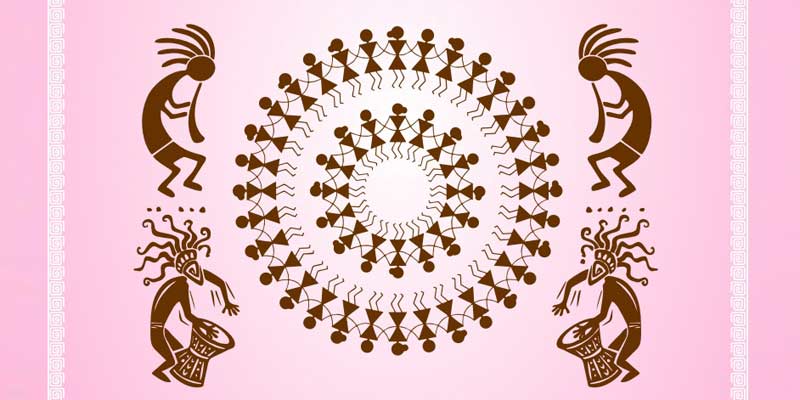- India
- Dec 13
Explainer / Zonal Cultural Centres (ZCCs)
• There are organisations under the ministry of culture for taking various steps to introduce people to Indian culture and traditions.
• For conservation and development of art, culture and crafts across the country, the ministry of culture has set up seven Zonal Cultural Centres (ZCCs).
• The Zonal Cultural Centres were conceived and set up as cultural distribution networks between 1985 to 1987 in order to promote, develop and link the various arts with people living in urban, rural and tribal areas of India.
• These centres are intended to become cultural organisations not limited to performances in closed auditoriums for limited audiences, but to outgrow into centres with thousands of folk artists, craftsmen at the grass-roots level as performers.
• These centers have been set up cutting across the territorial and linguistic boundaries and reflect and project not only the uniqueness of forms and culture of the participating states but also their linkages with each other as part of a composite Indian culture.
• These Zonal Cultural Centers were located away from the state capitals (except Eastern Zone Culture Centre in Kolkata).
• They are governed by a governing body which is headed by the governor of the state in which the Zonal Cultural Centre has its headquarters.
• The governing body consists of the nominees of the government of India not below the rank of joint secretary in the ministry of culture, a nominee of the participating state governments and eminent personalities in various art disciplines.
• Besides the governing body, the ZCCs also have a finance committee and programme committees to oversee and decide upon the program content for the year and the expenditure pattern. The day-to-day affairs of the centers are seen by the director of the Centre.
• The ZCCs are implementing a number of schemes. Rashtriya Sanskriti Mahotsavs (RSMs) are also conducted through these ZCCs where a large number of artists from all over India are engaged to showcase their talents.
• These ZCCs also organise 42 regional festivals for promotion of art and culture every year as per their programme calendar.
• For conducting various activities/programmes, ZCCs are provided regular annual grant-in-aid by the government.
Seven Zonal Cultural Centres
i) The North Zone Cultural Centre (NZCC) was established in November 1985 as a society registered under the Societies’ Registration Act 1860, with its headquarters at Patiala.
It is the first Zonal Cultural Centre established in the country.
The main objectives of NZCC are to preserve, innovate, promote and disseminate the arts of the Zone comprising the states of Punjab, Haryana, Himachal Pradesh, Rajasthan, Uttarakhand and Union Territories of Chandigarh, Jammu & Kashmir and Ladakh.
ii) The Eastern Zonal Cultural Centre (EZCC) was established in 1985. It is functioning as a society registered under the West Bengal Societies’ Registration Act, 1961 with its headquarters at Kolkata.
EZCC covers the states of Assam, Bihar, Jharkhand, Manipur, Odisha, Sikkim, Tripura, West Bengal and the Union Territory of the Andaman and Nicobar Islands.
iii) The South Zone Cultural Centre (SZCC) at Thanjavur in Tamil Nadu was established in January 1986.
It has jurisdiction over the states of Andhra Pradesh, Telangana, Karnataka, Kerala, Tamil Nadu and Union Territories Andaman and Nicobar Islands, Lakshadweep and Puducherry
iv) The West Zone Cultural Centre (WZCC) was established in 1986 as a society registered under the Rajasthan Societies’ Registration Act, 1958, with its headquarters in Udaipur.
The main objectives of the WZCC are preservation, promotion and dissemination of the folk/traditional arts of the zone comprising Rajasthan, Gujarat, Maharashtra, Goa and Union Territories of Daman & Diu and Dadra & Nagar Haveli.
v) The South Central Zone Cultural Centre was established as a society in the year 1986 with its headquarters in Nagpur.
Andhra Pradesh, Karnataka, Madhya Pradesh, Maharashtra, Chhattisgarh and Telangana are the member states of Centre.
vi) North Central Zone Cultural Centre was established in the year 1986 with its registered office at Allahabad.
The main objectives of this centre include preservation, innovation, promotion and dissemination of the various art forms covering the broad disciplines of music, dance, theatre, visual arts, literary activities and craft traditions with special focus on folk and tribal dying art forms within the constituent states of Uttar Pradesh, Madhya Pradesh, Bihar, Rajasthan, Haryana, Delhi and Uttarakhand.
vii) The North East Zone Cultural Centre was established in June 1986 with its headquarters at Dimapur, Nagaland with the main objective of promoting and preserving the rich cultural heritage of the northeast region.
The eight northeastern states — Arunachal Pradesh, Assam, Manipur, Meghalaya, Mizoram, Nagaland, Sikkim and Tripura are the constituent states of the North East Zone Cultural Centre.
Manorama Yearbook app is now available on Google Play Store and iOS App Store

